12 Effective Oblique Exercises for Toned Abs

Key Takeaways
In the pursuit of sculpted, toned abs, the old adage holds true: "Abs are made in the kitchen, not just the gym." While your diet undoubtedly plays a vital role, targeted ab workouts can truly unlock the potential of your core muscles.
Luckily, we’ve curated a selection of 12 highly effective oblique exercises that, when paired with a healthy diet, will bring you closer to your fitness goals. From dynamic twists to stability-enhancing moves, here are the best oblique exercises to engage and strengthen your obliques, the muscles that run along the side of your abdomen.
1) Side Planks
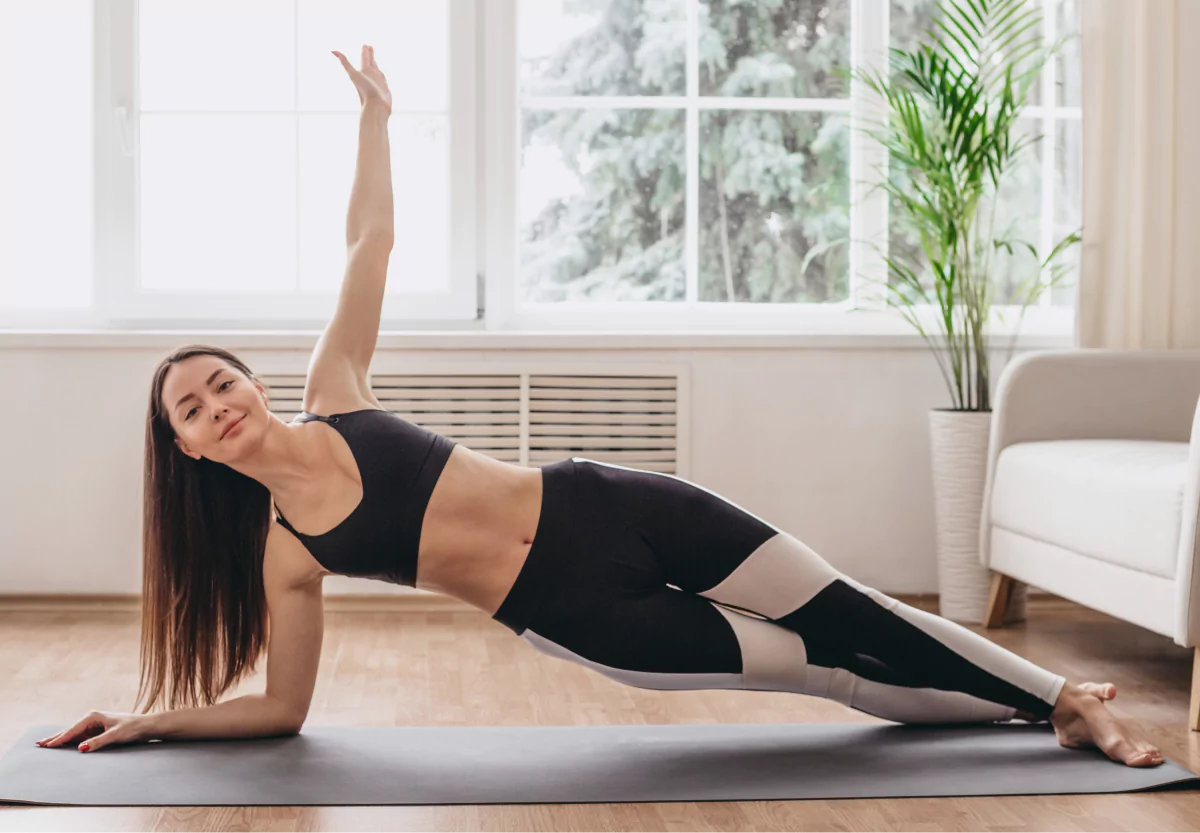
Side planks are a core-strengthening exercise that involve supporting your body weight by laying on your side and forming a straight line from head to heels. As a staple exercise in any oblique workout, this movement effectively targets the oblique muscles and engages other muscle groups, including shoulders and glutes.
How To Do a Side Plank
To perform a side plank:
- Lie on your right side with legs straight and feet stacked
- Lift your hips off the ground and maintain a straight line from head to heels
- Support your body on your forearm with your elbow directly beneath your shoulder, engage your core
- After holding the side plank position for the desired amount of time, switch sides and repeat on the left side
2) Sit-Up Twists
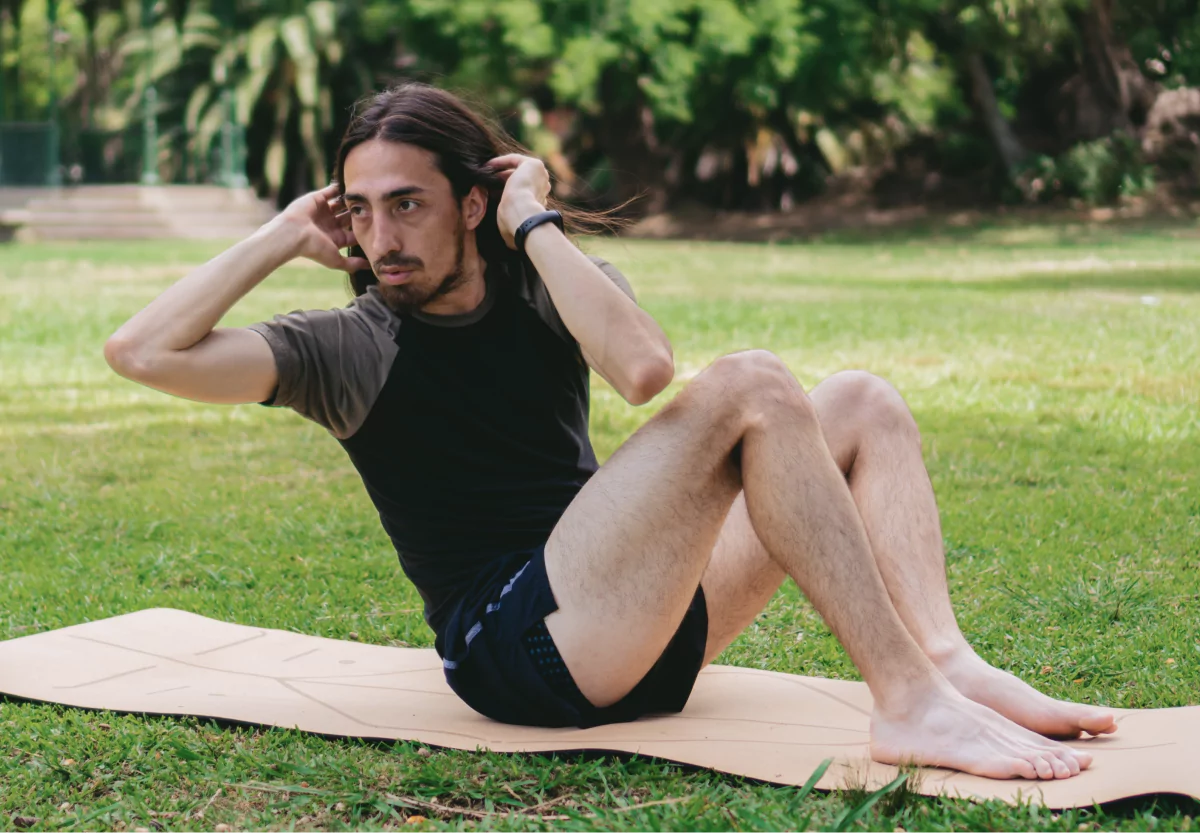
Sit-up twists are a dynamic core exercise that combine a traditional sit-up with a rotational movement to help you build a strong core. This movement engages the abdominal muscles, particularly the obliques, and also targets the hip flexors and lower back. It can also enhance core strength and promote overall stability.
How To Do a Sit-Up Twist
To perform a sit-up twist:
- Lie on your back with knees bent and feet flat on the ground
- Perform a sit-up, but as you rise, twist your torso to one side, aiming to touch your elbow to the opposite knee
- Return to the starting position and repeat on the other side for the desired amount of reps
3) Russian Twist

Russian twists are a dynamic core exercise that primarily target the internal obliques. They involve a twisting motion, which engages the entire core, including the rectus abdominis and transverse abdominis. This exercise is effective for building rotational strength, enhancing stability, and is easy to include in any home workout.
How To To a Russian Twist
To perform Russian twists:
- Sit on the ground with your knees bent and feet flat
- Lean back slightly, keeping your back straight, and lift your feet off the ground
- Holding a weight or your hands clasped together, twist your torso to one side and touch the object to your hip
- Return to the center and then twist to the other side and continue as needed
4) Cable Woodchop
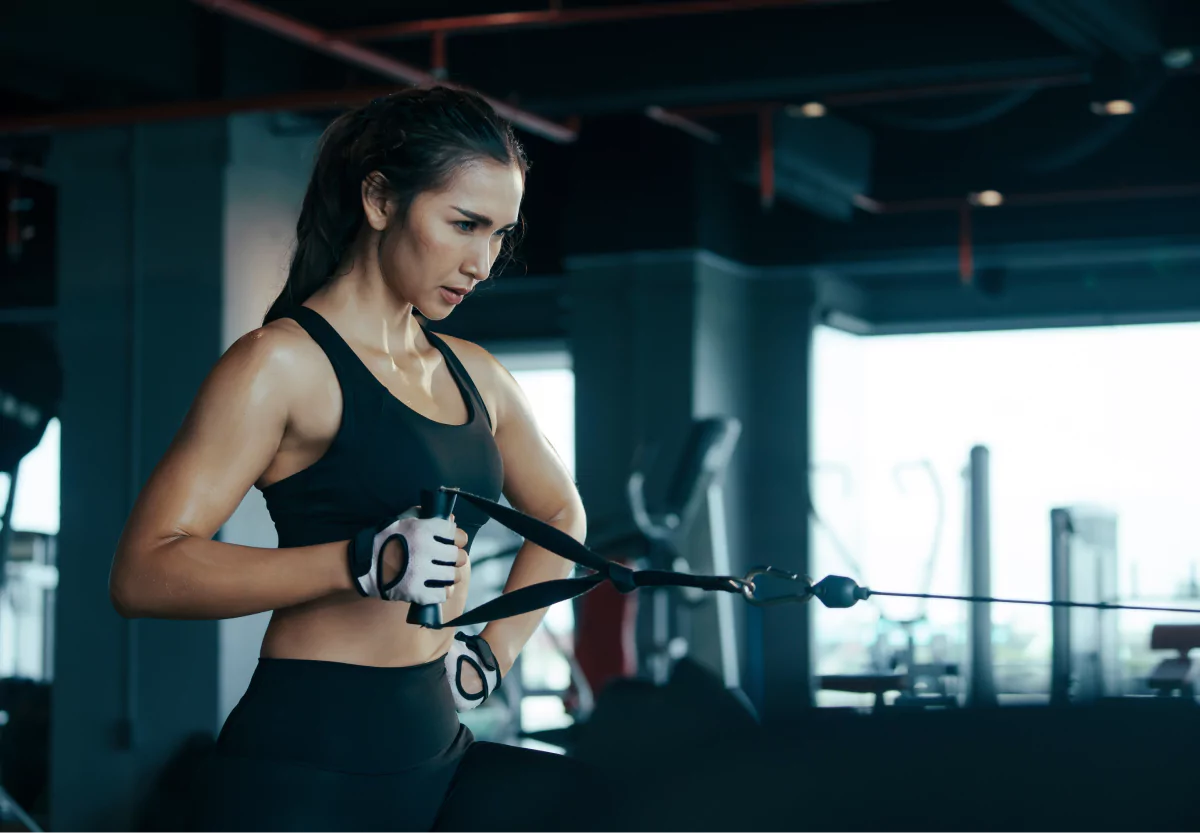
Cable woodchops are a functional exercise that target the core while also engaging the shoulders, hips, and back muscles. The exercise requires a cable machine and simulates a chopping motion, making it great for building rotational strength, enhancing core stability, and improving overall body coordination.
How To Do a Cable Woodchop
To perform cable woodchops:
- Stand with your feet shoulder-width apart, perpendicular to the cable machine
- Grab the cable handle with both hands, interlocking your fingers, and stand at a 45 degree angle to the machine
- Start with your arms extended diagonally above one shoulder and your core engaged
- Rotate your torso and pull the handle diagonally, finishing the motion with your hands near your opposite hip, and slowly return to the starting position
5) Hanging Knee Raise Oblique Crunch
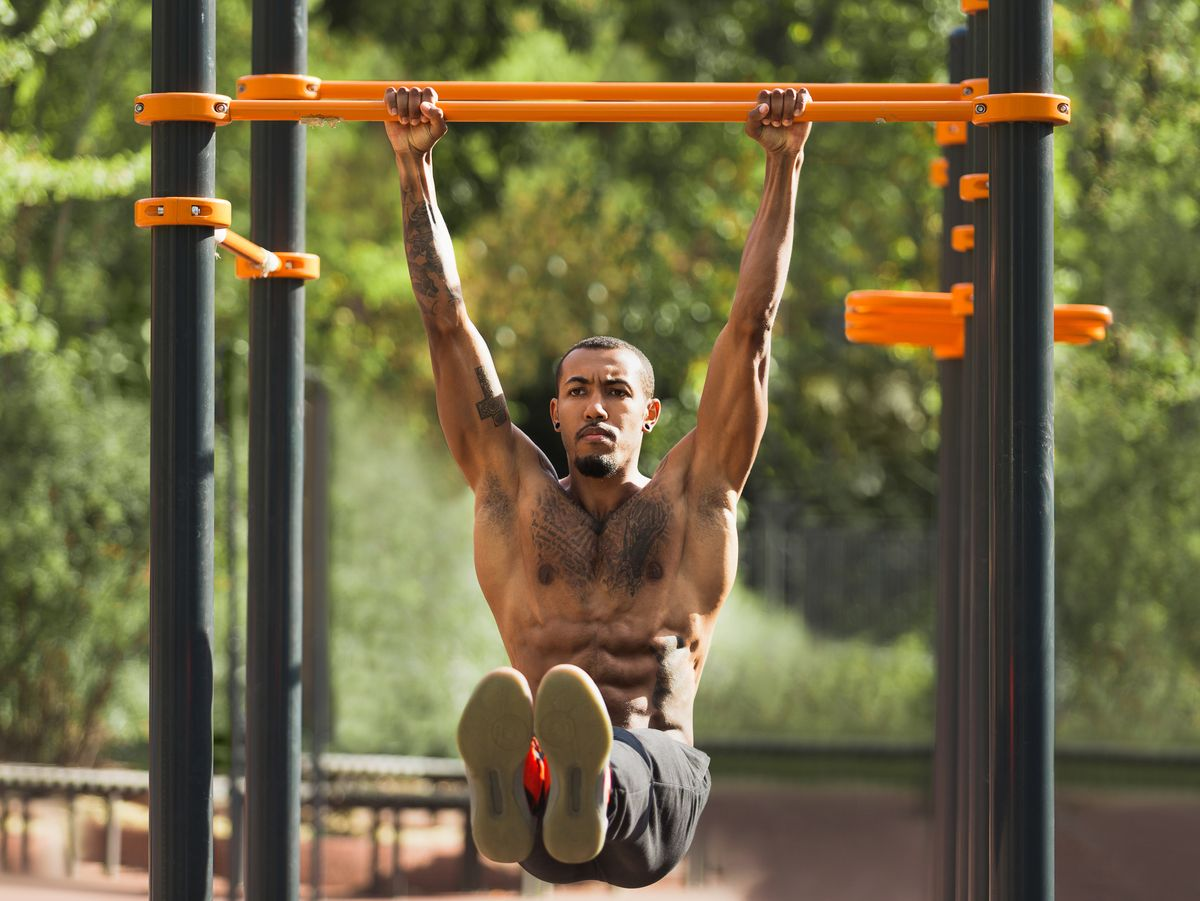
Hanging knee raise oblique crunches are an advanced core workout that combine the hanging knee raise, which engages the lower abs, with a twisting motion, intensifying the engagement of the oblique muscles.
This ab exercise works multiple muscle groups simultaneously, making it highly effective for building core strength, enhancing six-pack definition, and improving overall stability and coordination.
How To Do a Hanging Knee Raise Oblique Crunch
To perform hanging knee raise oblique crunches:
- Hang from a pull-up bar with your hands slightly wider than shoulder-width apart
- Engage your core and allow your legs to fully extend
- Raise your knees toward your chest, focusing on using your lower abdominal muscles to lift them
- As your knees reach the highest point, engage your obliques and twist your hips to the right, bringing your knees towards your right shoulder and repeat on the other side
6) High-Pulley Oblique Cable Crunch

High-pulley oblique cable crunches are a targeted core exercise that specifically isolate and strengthen the external obliques, helping to improve core stability, enhance definition in the waistline, and increase overall core strength.
How To Do a High-Pulley Oblique Cable Crunch
To perform high-pulley oblique cable crunches:
- Attach a rope handle to a high-pulley cable machine and adjust the weight stack to a challenging but manageable level
- Stand with your side to the machine and grab the rope handle with both hands
- Step away from the machine to create tension in the cable and place your feet about shoulder-width apart
- With your back straight and your core engaged, slowly bend your torso to the side, bringing your elbow down towards your hip
- Slowly return to the starting position and repeat on the opposite side
7) Lying Leg Oblique Throwdown
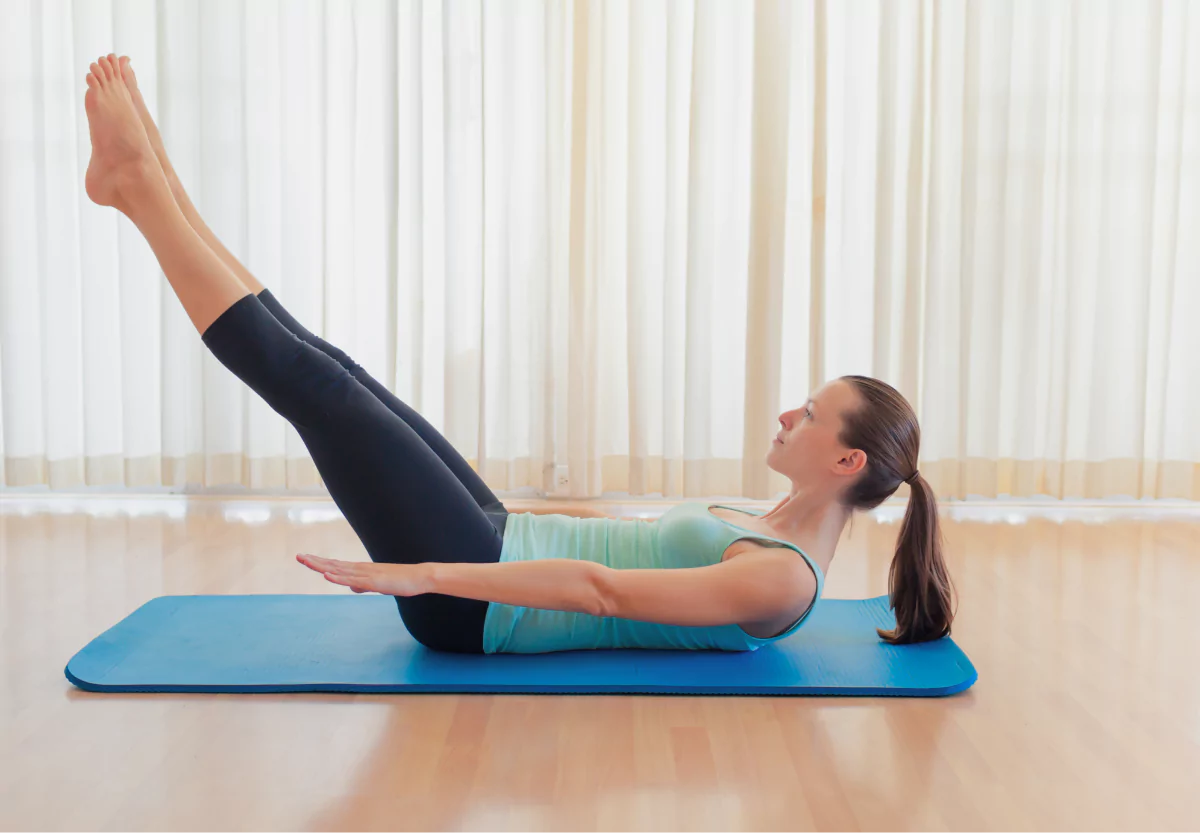
Lying leg oblique throwdowns are a core exercise that engage the obliques and lower abs. They require coordination and control, making it highly effective for building core strength, enhancing stability, and sculpting the waistline.
How To Do a Lying Leg Oblique Throwdown
To perform lying leg oblique throwdowns:
- Lie flat on your back on a mat, with your arms extended overhead and your legs straight
- Pressing your lower back into the mat to engage your core, lift both legs off the ground, keeping them straight and together
- While keeping your legs straight, lower them toward the floor, aiming to bring them as close to the ground as you can while maintaining control
- Just before your feet touch the ground, engage your obliques to lift your legs back up, bringing them to the starting position and repeat
8) Bicycle Crunch
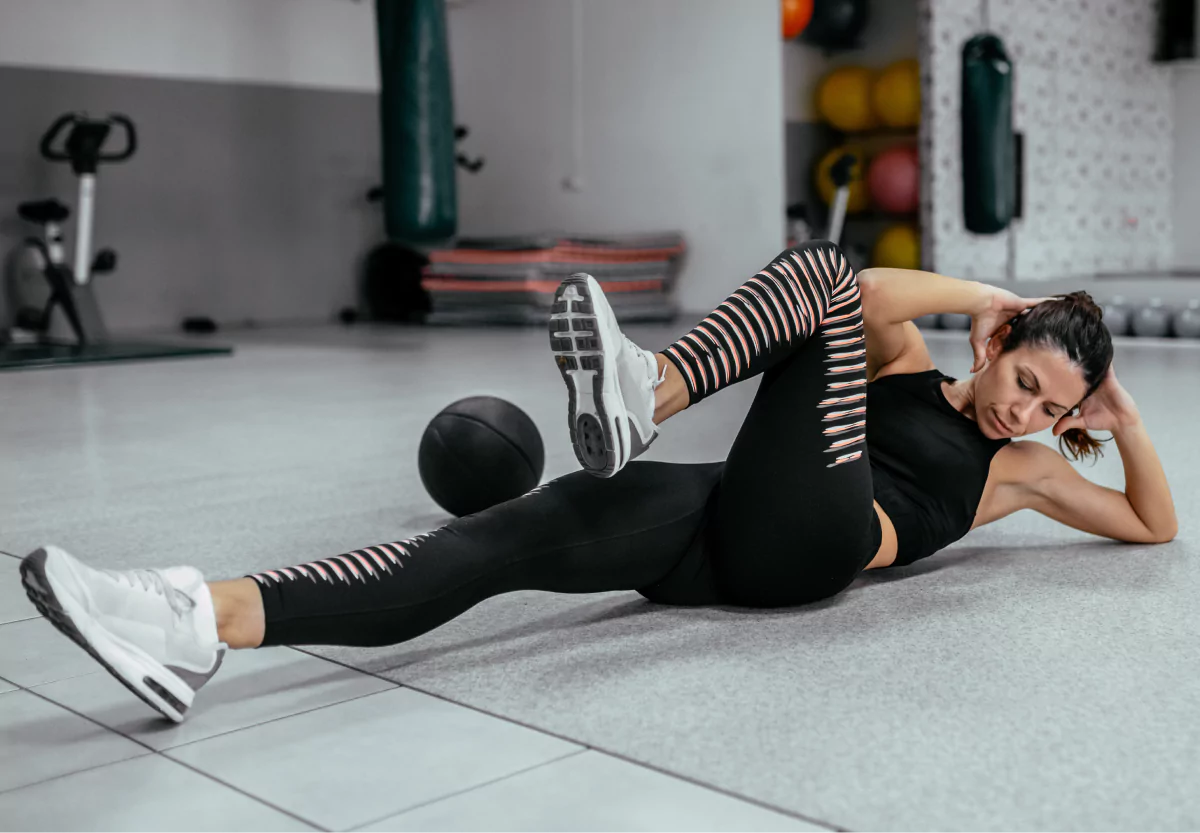
Bicycle crunches target multiple muscles, including the rectus abdominis, obliques, and hip flexors. They promote coordination and stability, making it an excellent choice for overall core strength and definition.
How To Do a Bicycle Crunch
To perform bicycle crunches:
- Lie flat on your back on a mat and lift your legs, bending them at a 90-degree angle
- Engage your core and lift your head, neck, and shoulders off the ground, bringing your right elbow towards your left knee
- Straighten your right leg while simultaneously bringing your left knee towards your chest in a pedaling motion
- Twist your torso to bring your left elbow towards your right knee
- Mimic a bicycling motion while your upper body engages in the twisting crunch until finished
9) Spiderman Planks

Spidermans are a plank variation that engage the abdominals, obliques, shoulders, and hip flexors. This exercise effectively targets the sides of your torso while also promoting shoulder stability and hip mobility.
How To Do a Spiderman Plank
To perform a Spiderman plank:
- Begin in a plank position and lift your right foot off the ground, bringing your right knee towards your right elbow in a controlled motion
- Hold this position for a brief moment, engaging your core
- Slowly straighten your right leg and return it to the starting plank position
- Repeat on the other side
10) Trunk Rotations

Trunk rotations are a core-rotation exercise that involve a twisting motion, engaging the entire core and promoting stability in the spine. This exercise is highly effective for enhancing rotational strength and strong obliques, improving functional movement, and aiding in sports performance.
How To Do a Trunk Rotation
To perform trunk rotations:
- Stand with your feet shoulder-width apart, arms extended, and knees slightly bent
- Tighten your abdominal muscles to stabilize your torso
- Slowly twist your upper body to the right, keeping your hips facing forward and allowing your arms to follow the movement
- Bring your torso back to the center, aligning your arms with your chest
- Repeat, this time twisting to the other side
11) Wall Ball Throws

Wall ball throws are a dynamic full-body exercise that involves throwing a weighted ball against a wall and catching it on the rebound, engaging multiple muscle groups including the legs, core, arms, and shoulders.
This is one of the best exercises for building explosive strength and coordination, and it also provides a cardiovascular benefit by elevating your heart rate.
How To Do Wall Ball Throws
To perform wall ball throws:
- Stand facing a sturdy wall, holding a weighted ball at chest level with both hands
- Bend your knees and hips to lower into a squat position
- Push through your legs and extend your hips, straightening your legs as you simultaneously throw the ball up towards the wall
- As you release the ball, fully extend your arms and follow through with the movement
- Quickly position yourself to catch the ball on its rebound from the wall, bending your knees to absorb the impact, and repeat
12) Suitcase Carry

A suitcase carry (or farmer’s carry) targets the entire body involves holding a heavy weight in each hand and walking a certain distance or for a specified duration. This exercise is particularly beneficial for improving grip strength, posture, and stability.
It also mimics real-world activities like carrying groceries or luggage, enhancing functional fitness. It’s especially important to flex your core, keep your shoulders back, and use proper form while performing this exercise to limit the risk of injury.
How To Do a Suitcase Carry
To perform a suitcase carry:
- Stand with your feet shoulder-width apart and hold a heavy weight, like dumbbells or kettlebells, in both your left hand and right hand, letting the weight hang at arm's length by the side of your body
- With your chest up, shoulders back, and your back straight, begin to walk in a controlled manner, taking deliberate steps
- Carry the weights for your desired distance or time and slowly lower them to the ground when finished
Find the right Nutrisense programto turn insight into progress.
Go Beyond Glucose Data with Nutrisense
Your glucose can significantly impact how your body feels and functions. That’s why stable levels are an important factor in supporting overall wellbeing. But viewing glucose isn't enough. Nutrisense, you’ll be able to learn how to use your body's data to make informed lifestyle choices that support healthy living.
One-to-one coaching
Sign up to access insurance-covered video calls to work with a glucose expert: a personal registered dietitian or certified nutritionist who will help tailor your lifestyle and diet to your goals.
Monitor and measure what matters
With the Nutrisense CGM Program, you can monitor your glucose with health tech like glucose biosensors and continuous glucose monitor (CGM)s, and analyze the trends over time with the Nutrisense App. This will help you make the most informed choices about the foods you consume and their impact on your health.
Find your best fit
Ready to take the first step? Start with our quiz to find the right Nutrisense program to help you take control.

Heather is a Registered and Licensed Dietitian Nutritionist (RDN, LDN), subject matter expert, and technical writer, with a master's degree in nutrition science from Bastyr University. She has a specialty in neuroendocrinology and has been working in the field of nutrition—including nutrition research, education, medical writing, and clinical integrative and functional nutrition—for over 15 years.

.webp)


